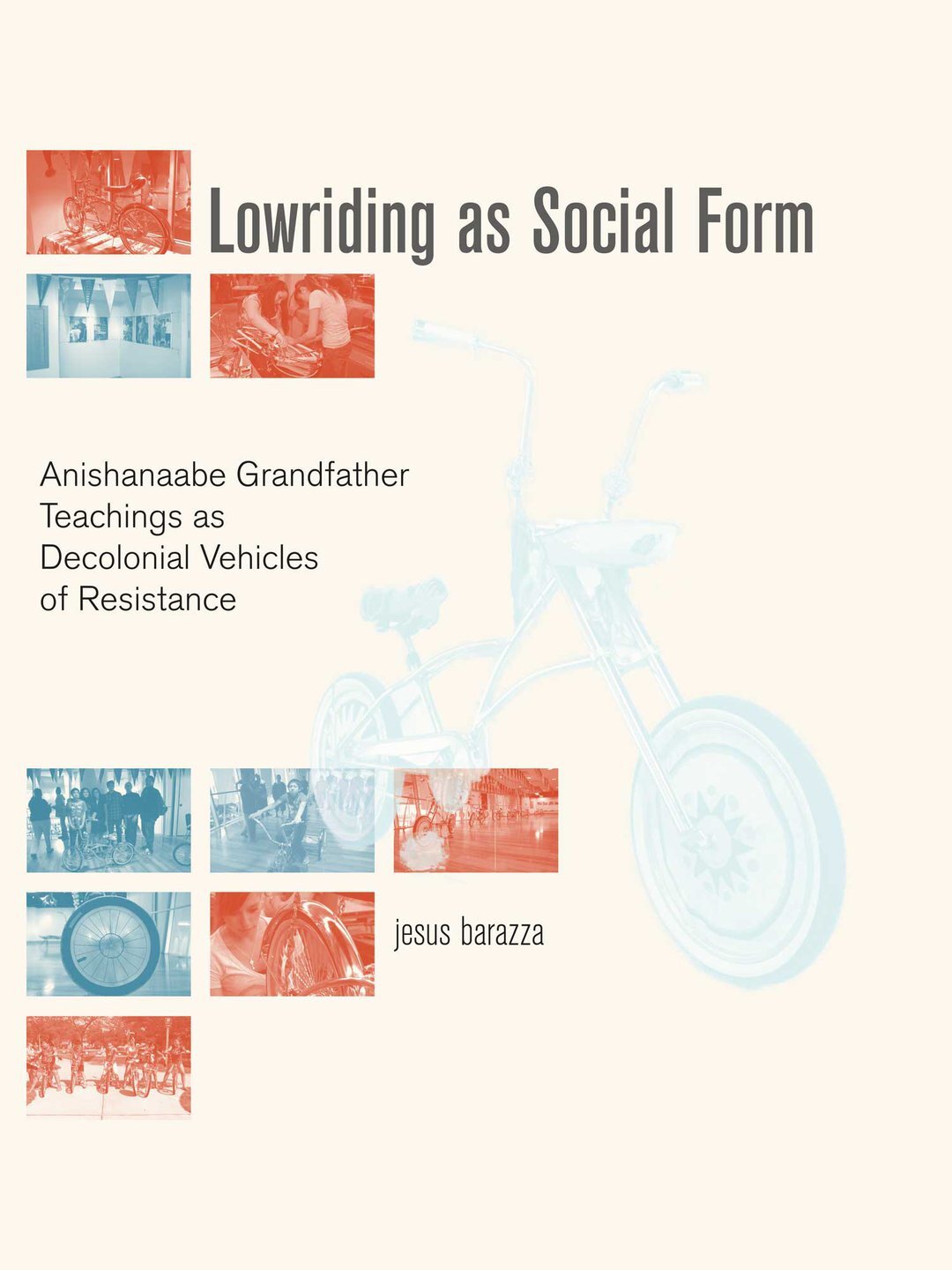Jesus Barraza
class of 2016
2025 ALUMNI AWARD RECIPIENT
Jesus Barraza, the elected recipient of the 2025 Visual & Critical Studies Alumni Award, is a distinguished artist, printmaker, educator, activist, community leader, and social practitioner based in San Leandro. Currently, Barraza is a lecturer at UC Berkeley in the Ethnic Studies and Art Practice department, with a focus on Xicanx Art History & Practice, a member of JustSeeds Artists Cooperative, and the co–founder of Dignidad Rebelde, a community-driven graphic arts collaboration that amplifies community voices, struggles, and resistances. His work has been exhibited nationally and internationally, including at the de Young Museum of Art, San Francisco; Museum of Contemporary Native Art, Santa Fe; El Paso Museum of Art; Museo de Arte de Ciudad Juarez, MX; and Parco Museum, Tokyo.
Barraza holds a BA in Raza Studies from San Francisco State University, and earned dual graduate degrees from California College of the Arts in 2016, an MFA in Social Practice and an MA in Visual & Critical Studies. At CCA, Barraza explored tactics of decolonial social practice and Indigenous knowledge production in contemporary contexts in his VCS thesis entitled, “LOWRIDING AS SOCIAL FORM: ANISHINAABE GRANDFATHER TEACHINGS AS DECOLONIAL VEHICLES OF RESISTANCE.” Exploring artist Dylan Miner’s ongoing project and community-based workshop series, Native Kids Ride Bikes, Barraza investigated how lowrider bicycles—and the communal process of making and customizing them—can be tools for reviving cultural memory among Indigenous youth. As he argued, projects like Miner’s demonstrate alternative pathways for political resistance in the face of contemporary realities of extraction, displacement, and dispossession, ones grounded in traditional and sacred knowledge practices. This work was both a personal and political undertaking—an extension of Jesus’ lifelong dedication to resisting colonial erasure and uplifting cultural memory through creative expression.
Long before I [Vanessa], came to study art history in college and moved to the Bay Area, as a high schooler sometime around 2012, my older sister first introduced me to Jesus Barraza’s and his co-founder Melanie Cervantes’ printmaking work as Dignidad Rebelde by gifting me a couple of their silkscreen prints. Their bold and colorful graphics gave visual form and weight to a number of the national and localized issues I was witnessing and was instrumental in helping shape my own politics, including around Indigenous sovereignty, global resistance movements, migration, police violence, and worker’s rights. In doing so, their prints not only shaped my political consciousness, but introduced me to a historic lineage of graphic political art and the grassroots activist efforts they reflected. Beyond visual statements, Dignidad Rebelde offered me a radical vision of what art could look like when it's directly in service to the community and accountable to the people it represents.
Jesus’ continued efforts at Dignidad Rebelde and across various other projects embody the same values he explored in his time at CCA. Through, as Dignidad Rebelde states, “creat[ing] art that can be put back into the hands of the communities who inspire it,” Barraza pulls art and creative practice out of the theoretical space, and puts it into effective action. Further, Barraza’s work also exemplifies a sense of intergenerational and inter-community solidarity, which we have seen reflected in his work as an educator and mentor for the next generations of artists and cultural workers. His work continues to remind us that artistic practice and research can be an instrument for building movements, sharing knowledge, remembering, and imagining otherwise. Barraza’s practice of intertwining knowledge sharing, art-making, and cultural archiving represents a truly community-driven activist art practice.
Each year, the graduating Visual and Critical Studies cohort nominates an alumni of the program to receive the Visual & Critical Studies Alumni Award. The award is intended to recognize a VCS community member whose continued work and efforts embody the interdisciplinarity and dedication to scholarship and criticality core to the program’s values and the field of Visual and Critical Studies. For us, the 2025 VCS cohort, Barraza’s multi-valent commitment to community empowerment, critically-engaged creative praxis, and social justice truly carries the spirit of interdisciplinarity and critical labor within Visual and Critical Studies that has been so influential to our work. We are honored to inherit the legacy of Jesus’ values, his critical practice, dedication to his community, and passion for the work he does.
– Vanessa Pérez-Winder and Samantha Hiura (VCS Class of 2025)
about
Jesus Barraza is a interdisciplinary artist and is pursuing an MFA in Social Practice and a Masters in Visual Critical Studies. He holds a BA in Raza Studies from San Francisco State University. His work focused on the new generation of Xicana/o printmakers applying the methodologies of the Chicana/o Art Movement in a contemporary context. Recently his research has focused on Indigenous artists whose work engage issues of Indigeneity and embody a “Decolonial Attitude”. He is a co-founder of Dignidad Rebelde a graphic arts collaboration that produces screen prints, political posters and multimedia projects and a member of JustSeeds Artists Cooperative a decentralized group of political artists based in Canada, the United States and Mexico. From 2003-2010 he was a partner at Tumis design studio where he worked as web developer, graphic designer and project manager.
In September of 2014 Barraza led Dignidad Rebelde’s mural for the 5×5 Project, Washington DC’s largest temporary public art initiative as part of Stephanie Sherman’s Near Futures project. In June of 2014 Barraza participated in the exhibit Chicano Dreams at the Musée d’Aquitaine in Bordeaux, France. In November 2013 Dignidad Rebelde presented their exhibition Future Ancestors at SoleSpace in Oakland and in September 2013 Barraza was invited to participate in the “Embedded in Community: What Is Social Practice?” panel at Leeway Foundation’s REVOLVE: An Art for Social Change Symposium.
jesus’s thesis
LOWRIDING AS SOCIAL FORM: ANISHINAABE GRANDFATHER TEACHINGS AS DECOLONIAL VEHICLES OF RESISTANCE
This thesis focuses on contemporary artists, Postcommodity and Celia Herrera Rodriguez, who employ conceptual strategies to challenge the legacy of colonization and dehumanization with a complex social practice. This thesis is an examination of tactics to recover traditional cosmologies and spiritualities while remaining grounded in contemporary realities of detribalization, displacement, and globalization. Linking indigenous concepts of land to Postcommodity’s land art installation demonstrates the limitation of the dominant notions of the genre and produces a multilayered interpretation of working with nature. By connecting Xicana feminist thought with installation art theory, this thesis asserts that Rodriguez’s spiritual traditions establish the altar as a critical installation form. These artists challenge the dominant notions of Western aesthetic traditions and transform how participants and viewers engage a decolonized worldview.


